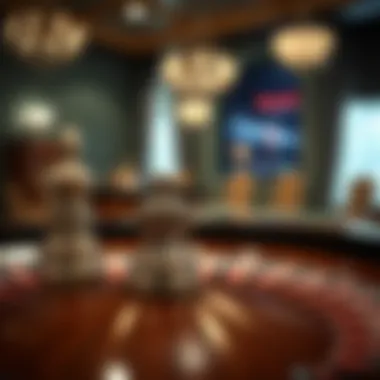Master Free Roulette Practice and Improve Your Skills


Intro
Navigating the world of roulette can be daunting, especially for newcomers. Free roulette practice provides a golden opportunity to dip one’s toes into the game without the weight of financial risk. This essential practice helps players hone their skills, understand the mechanics of betting, and develop effective strategies.
Being well-versed in the game rules and various betting types can make or break a player's experience at the table. Furthermore, it underscored the importance of recognizing psychological factors at play, such as the thrill of gameplay and how it impacts decision-making.
Utilizing platforms that offer free roulette allows both novices and experienced players alike to polish their techniques, explore different game variations, and ultimately build confidence. Each practice session becomes a step towards mastery, crafting a more informed and skillful gambler.
Betting Strategies
Understanding betting strategies in roulette is critical for any player aiming for success. Roulette offers a rich tapestry of options when it comes to betting - from straightforward bets on red or black to more nuanced wagers like dozens or columns. By mastering these strategies, gamblers can increase their chances of winning as well as get entrenched in the game.
Fundamental Concepts
At the heart of successful roulette betting lies a grasp of fundamental concepts. One of the first areas to focus on is the type of bets, which can broadly be categorized into inside and outside bets. Inside bets tend to have higher risk and higher payouts, while outside bets generally offer lower risk and minimized wins.
- Inside Bets:
- Outside Bets:
- Straight Up: Betting on a single number.
- Split Bet: Wagering on two adjacent numbers.
- Street Bet: Betting on three numbers in a row.
- Red or Black: Betting on the color of the winning number.
- Odd or Even: Betting on whether the number will be odd or even.
- Dozens: Betting on one of the three dozens.
These concepts lay the groundwork for a deeper understanding and mastery of roulette. Players should start with the basics, gaining experience with lower-risk bets before venturing into the more daring inside bets.
Advanced Techniques
Once familiar with fundamental bets, players can explore advanced techniques that will sharpen their gameplay. One popular strategy is the Martingale system. This approach involves doubling your bet after each loss, theoretically allowing for recovery of losses once a win occurs. While it may seem appealing, it's essential to be cautious, as this strategy can lead to substantial losses if you hit a streak of bad luck.
Another technique is the Reverse Martingale, where players increase their bets after winning. This method aims to capitalize on winning streaks, allowing players to maximize their gains while minimizing risk.
Furthermore, employing a flat betting approach can help manage bankroll effectively. This entails betting the same amount consistently, providing a more stable financial approach during practice.
To summarize, familiarity with betting strategies, from basic concepts to advanced techniques, forms the crux of any roulette player's education. By thoroughly understanding these concepts, players can enhance their gameplay and reliability at the table.
"In the game of chance, knowledge is as important as luck."
For those getting their feet wet in roulette, incorporating free practice can lead to valuable insights and more strategic betting methods as one gains experience. Exploring various platforms will also enrich this learning experience, establishing a solid foundation for enjoyment and potential success.
Understanding Roulette
Roulette, a game that spins excitement and the possibility of fortune, is not just about luck; it's a simple yet intricate game that players of all types can engage with. Understanding the essence of roulette goes a long way in this high-stakes game. It’s crucial for a number of reasons, from deepening player engagement to crafting effective strategies, which can ultimately enhance the gaming experience.
First off, grasping the key concepts of roulette helps players avoid common pitfalls. Knowing the rules can keep you from making rookie mistakes which could be costly. Players often get swept away by the thrill of the game, and without a solid foundation, they might push their luck too far. By understanding how the game is played, one can make informed decisions. This understanding brings a sense of control, even in a game driven by chance.
Moreover, a deeper insight into roulette opens up conversations about strategies and betting systems that can improve overall gameplay. Understanding the nuances of the betting options, like outside and inside bets, equips players with the knowledge to build their approach. Being able to articulate what you’re doing and why is vital, especially when exploring free practice options, as it gives the player insight into evaluating their methods of play.
Ultimately, understanding roulette is a long-term investment. It sets the stage for comprehensive skill development and provides a groundwork for refining strategies that can be adjusted as experience grows. It's a solid stepping stone, ensuring players are not only playing against the odds but also mastering the art that is roulette.
History of Roulette
Roulette has a rich tapestry dating back to its origins in 18th century France. The game is thought to have evolved from earlier games like Roly Poly and the Italian board game Hoca. As it traveled through the corridors of time, it landed in casinos across Europe and, eventually, to the gambling meccas of Las Vegas and Monte Carlo.
The name "roulette" itself translates to "little wheel" in French, and that’s precisely the heart of the game. The contradictions in its history, from various versions to legal challenges, paint a vivid picture of how this game has charmed its way into history. From the opulent tables in grand European casinos to the digital formats available online today, roulette’s evolution deserves to be highlighted.
Variations of the Game
Roulette isn’t a one-size-fits-all experience. There are different variations offering unique gameplay dynamics, and being aware of these can significantly influence your approach to free practice. Notably, three major variations dominate the landscape: American Roulette, European Roulette, and French Roulette.


American Roulette
American Roulette stands out with its distinctive wheel layout, featuring 38 pockets: numbers 1 through 36, a single zero, and a double zero. This extra pocket increases the house edge compared to other variations, which is pivotal for players to contemplate when devising strategies. Its design and structure lead to a thrilling gaming experience, yet one must acknowledge that it generally offers worse odds than its European counterpart.
This version’s appeal lies in its vibrant gameplay and the excitement generated by high-stakes betting. Players attracted to the relentless flair of Las Vegas often find American Roulette to be an exhilarating choice. While the double zero adds to the allure, understanding the implications of the odds is essential for any savvy gambler.
European Roulette
European Roulette offers a more favorable landscape for players, featuring only one zero and 37 pockets on the wheel. This setup reduces the house edge, making it a more strategic choice for players looking to stretch their bankroll while practicing.
The allure of European Roulette is in its straightforward yet elegant approach. Bettors can enjoy a variety of betting options that balance risk and reward while keeping the gameplay engaging. This variation provides an ideal platform for practice, enabling players to hone their skills without the added stress brought by higher house odds present in other forms.
French Roulette
French Roulette shares similarities with its European counterpart but introduces unique betting rules like "La Partage" and "En Prison." Both rules work to provide better odds, allowing players to recoup half their bets on even-money wagers if the ball lands on zero. It's a sophisticated feature that enhances the game's appeal, making French Roulette popular among seasoned players.
The elegant table layout and the historical context artistically blend to create a distinct experience. Players looking to understand the mechanics of roulette more deeply might favor this version as it showcases strategic play beautifully. Overall, alongside its appealing characteristics, French Roulette serves as an educational avenue for those aiming to master the game.
Each variation offers its intricacies and approach to gameplay. Understanding these differences is essential for any player trying to refine their skills effectively or to transition into practical applications of their newfound knowledge.
Significance of Free Practice
Free roulette practice holds a vital place in the journey of learning this captivating game. The importance of engaging with free practice comes across in various aspects such as skill enhancement, psychological readiness, and strategic experimentation. With the opportunities that this practice provides, players can explore the intricacies of roulette without the pressure of financial loss. This aspect makes free practice pivotal for both budding players and seasoned participants alike.
Benefits of Free Practice
Skill Development
Skill development is a cornerstone of free practices. It offers players a unique opportunity to familiarize themselves with game mechanics, such as how the wheel spins and how bets are placed. Unlike the hectic environment of a real casino, practice provides a calm space for learning. Players can revisit their moves, consider their decisions, and gradually build confidence. This isn’t just beneficial; it’s essential for those who want to refine their approach. By practicing, individuals sharpen their instincts and learn when to take risks and when to stand back, building the foundations for future success.
Understanding Game Mechanics
Understanding game mechanics is crucial for mastering roulette. Every spin bears itself out in the form of odds and payouts. Free practice allows players to grasp these elements without the fear of losing money. Whether it’s the difference between American and European roulette or recognizing how the house edge plays into each game, free practice bridges this learning gap. The key characteristic of this aspect is its decentaly for those trying to grasp the fine details of the game. Players can learn not just to play, but to play smart. It sets a laid-back environment, enabling players to soak in the different strategies that make up the game.
Strategy Testing
Strategy testing is another critical component of free practice. Players can dabble with various betting systems like the Martingale System or the Fibonacci Strategy. What’s remarkable here is the lack of pressure. Practicing these ideas without financial stakes gives players the leeway to discover what works best for their style. They can see the effects of their strategies unfold in real-time, tweaking and adjusting along the way. This experimentation is a handy weapon in a player's toolbox, allowing for informed betting when they step into the real game.
Psychological Factors
Risk Management
Risk management is a centerpiece of successful gambling. In roulette, managing bets wisely is as crucial as knowing the game itself. Free practice allows players to experiment with different strategies without losing real money, which enhances their understanding of how to allocate funds efficiently. It's a playful nose around the defensive strategies, helping players learn their thresholds. Instead of panicking at high stakes, players can test what feels comfortable for them, honing this critical skill in a low-stakes environment.
Stress Resilience
Stress resilience speaks volumes in the landscape of gambling. It's one thing to have a sound strategy, and another to maintain composure when the stakes start climbing. By practicing in a risk-free setting, players can build their tolerance towards stressful situations. They are free to experience the highs and lows of the game without financial repercussions. This aspect of practice can significantly elevate a player’s performance. When they find themselves in high-pressure spots during real play, they become better equipped to handle their emotions.
Decision Making Under Pressure
Lastly, decision-making under pressure is an essential aspect of gambling. Roulette is often about making split-second decisions, especially when it comes to betting patterns. Free practice prepares players for these moments by putting them through real-time scenarios where they learn to trust their instincts. This environment cultivates a habit of quick thinking and compels players to analyze their actions and outcomes. Importantly, this trait can dramatically influence a player’s overall success.
"Free practice isn’t just about learning to play roulette, it’s about understanding the deeper layers of decision-making and strategy that underpin the game."
In summary, free practice forms the foundation for many critical aspects of roulette, from skill development to psychological preparedness. Understanding its significance empowers players with knowledge, strategies, and the mental tools necessary for the ever-evolving landscape of roulette.
Platforms for Free Roulette Practice
When it comes to mastering roulette, the right platforms for practice can make all the difference. With the game’s growing popularity, various options are available for players looking to hone their skills without the financial risk. Understanding these platforms can enhance not only your gameplay but also your overall experience in the casino world.


Online Casinos with Free Versions
Online casinos often provide free versions of their roulette games, allowing players to enjoy the thrills without the betting pressure. This feature is significant for both novices and seasoned players looking to try out new strategies or simply relax without financial stakes. Players can select between different variants like European, American, or even French roulette, offering them the chance to familiarize themselves with the game rules specific to each variant.
Many online casinos, such as Bet365 or 888 Casino, provide a seamless experience with user-friendly interfaces. The games are typically available in demo mode, which allows for unlimited playtime. However, it’s wise to note that while playing in free mode, features like payouts and bonuses may not be accessible as they would be in real-money versions. With this in mind, players should take full advantage of free play to build a solid foundation before shifting to real stakes.
Mobile Apps for Practice
The rise of mobile applications has brought roulette practice right to the palm of your hand. Apps like Roulette Royale or Roulette Master have emerged, catering to a vast audience of players eager to practice on the go. These apps provide a convenient option for those who may not have access to a computer or who prefer the flexibility of gaming from their phones.
One of the perks of mobile apps is the ability to practice anytime and anywhere. This accessibility can be particularly helpful for busy individuals. Plus, many apps offer tutorials, which helps players understand the game even better. However, while many apps are free, others might include in-app purchases or advertisements, which can sometimes tarnish the gaming experience. Players should read reviews and look for apps known for clean interfaces and educational content.
Simulation Software
For those who want an elevated level of practice, simulation software represents a more comprehensive tool. Programs like Roulette Simulator offer players the ability to engage with advanced analytics that assess their gameplay, including tracking wins and losses over time. This software can simulate various scenarios, allowing players to test different strategies in a controlled environment.
Unlike simpler online versions or mobile apps, simulation software often focuses on the statistical aspects of the game. This means players can dive deep into understanding probabilities and outcomes better. It’s an excellent resource for serious gamers keen on refining their approach based on data, rather than solely on gut instincts.
"In roulette, understanding the mechanics can be your best ally. Platforms for practice facilitate a deeper comprehension of both game dynamics and personal strategy formulation."
Choosing the right platform for free practice entails understanding personal preferences and objectives. Whether attempting to develop strategies, familiarize oneself with different game types, or simply enjoy the game without pressure, there is an avenue available. As you venture into the world of roulette, these platforms will serve as your stepping stones toward eventual success in real play.
Strategies for Effective Practice
When it comes to honing your skills in roulette, the right strategies can be the key to earning a firm grip on the game. It’s not just about spinning that wheel and hoping for the best. Effective practice means building a toolbox of skills, techniques, and approaches that can enhance your gameplay and help you make the most of your experience without the pressure of real money on the line. In this section, we’ll explore some popular betting systems and the importance of analyzing game patterns, as these strategies can set you apart from casual players.
Utilizing Betting Systems
A betting system is a structured approach to placing bets in roulette, which can help players keep track of their winning and losing patterns. Importantly, it does not guarantee victory but provides a framework to make informed decisions. Different systems cater to various playing styles, whether you’re a cautious bettor or one who likes to take calculated risks.
Martingale System
The Martingale System is probably one of the most famous betting strategies in the roulette world. The core idea here is simple: when you lose a bet, you double your wager for the next round. This means that when you finally win, not only do you recover your losses, but you also gain a profit equal to your initial stake. The key characteristic of the Martingale System is its straightforwardness and its appeal to new players looking to recoup losses quickly.
However, it’s worth noting that this system has its downsides. There’s a risk of reaching the table limit if you encounter a losing streak, which can escalate your bets significantly.
"The Martingale System can be a wild ride; just be sure you know when to hold ‘em and when to fold ‘em."
Fibonacci Strategy
The Fibonacci Strategy is rooted in the famous Fibonacci sequence, where each number is the sum of the two preceding ones (1, 1, 2, 3, 5, 8, and so on). When applying this to betting, players increase their stakes based on this sequence after a loss. This method offers a more tempered approach compared to the Martingale System. It allows players to gradually increase their bets, which can mitigate significant losses while still paving a path to catch up when luck turns positive.
The unique feature of the Fibonacci Strategy is its gradual and constructed nature, allowing bettors time to recalibrate. However, like any system, it’s not foolproof. Players may still face losses, and it requires disciplined tracking to maintain progress.
'Alembert Strategy
The D'Alembert Strategy introduces another way to manage bets, operating on the principle of equilibrium. This method involves increasing your bet by one unit after a loss and decreasing it by one unit after a win. The essence here is to find a balance, allowing players to recover losses slowly over time.
What makes the D'Alembert Strategy stand out is its manageable approach, particularly for those who prefer a measured betting style. It's less aggressive than Martingale, which may appeal to players concerned about rapidly escalating bets. Yet, it also comes with the caveat of needing a consistent win-rate to leverage its margins effectively.
Analyzing Game Patterns
Understanding game patterns is crucial for any player who wishes to elevate their roulette skills. Every spin of the wheel is technically an independent event, but players often find comfort in observing patterns from previous rounds. By analyzing these repetitions and trends, players can inform their next moves. This can include tracking numbers, colors, or even sectors of the wheel.
Most seasoned gamblers will tell you that while the game is rooted in chance, a keen eye for potential patterns can lend an edge. However, it’s essential to approach this with a level-headed mindset. Patterns can mislead, and solely relying on them can result in frustration or loss. The key takeaway is to use pattern analysis as a guide rather than a guarantee.
Mistakes to Avoid During Practice
Understanding the common pitfalls associated with free roulette practice is essential for any player aiming to hone their skills. A successful roulette journey requires more than merely spinning the wheel. It demands a strategic approach that encompasses self-awareness and adaptability.


When players overlook key mistakes, they risk cementing bad habits that could translate into negative experiences when they eventually transition to real play. Each error can lead to wasted time and unproductive practice sessions. Accountability in recognizing these mistakes can shape a more profound understanding of the game, ensuring that a player maximizes the benefits of their practice.
Overcommitting to Strategies
One of the most frequent errors entails an over-reliance on specific betting strategies. Many players get caught up in their favorite system—like the Martingale or Fibonacci—and stubbornly stick to it, regardless of the game context. This can lead to a narrow viewpoint on game outcomes.
It's important to treat these strategies as tools rather than laws. Relying too heavily on one method can create complacency. Imagine pouring your heart and soul into a single equation in math class, only to find out there are multiple solutions. Roulette thrives on randomness, and while strategies might offer structure, they don’t guarantee success. Keeping an open mind toward alternative approaches can enhance overall gameplay.
Key Considerations for Strategy Management:
- Diversify the strategies you experiment with
- Periodically assess the performance of your chosen systems
- Acknowledge that no single strategy works all the time
Neglecting Game Variants
Another significant mistake is overlooking the various game variants. Most players associate roulette with the familiar American version. However, the game’s nuances drastically change between its European and French forms. Each variant comes with its own set of rules and house edges that can directly impact a player's odds.
By not engaging with different types of roulette, players limit their understanding and adaptability. Familiarizing oneself with the distinctions can add depth to the practice. Players might uncover preferences for certain games or discover unique strategies that apply better to a specific type of roulette.
Considerations for Exploring Game Variants:
- Try spinning the European wheel for a lower house edge
- Explore French roulette's unique rules like "La Partage"
- Recognize how different betting styles fit each variant
In summary, avoiding these frequent blunders can elevate the quality of practice sessions. An open-minded approach, combined with an awareness of strategies and game variants, is essential for developing a comprehensive skill set in roulette. Continuous evaluation and adaptation pave the way for success in both free practice and real play.
Transitioning from Practice to Real Play
Making the leap from practicing roulette for fun to engaging in actual play can feel like jumping from the shallow end of the pool into the deep end. It’s a significant shift that brings a whole new set of dynamics into the mix. This transition involves more than just throwing chips on the table. It requires a solid grasp of the game, an understanding of personal limits, and a strategy that carries over from practice sessions.
First and foremost, the psychological aspect of gambling can’t be ignored. In practice, there’s no financial risk; losses don’t sting and victories lead to a sense of accomplishment without the heavy weight of reality. However, once real money comes into play, even the most seasoned players can feel nerves as tight as a drum. Recognizing this shift helps in managing what one might feel going forward.
It’s essential during this phase to apply the strategies mastered during practice. If you’ve spent hours figuring out the intricacies of the Martingale or Fibonacci systems, now is the time to put them to the test in a less forgiving environment. This is where the benefits of free practice shine; experience makes for a smoother transition.
In summary, moving from practice to real play is not just a step up but a meticulous transformation requiring preparation and mental resilience. This cognitive shift can significantly impact how one plays and perceives the game going forward. Now, let’s break down some vital components of making this transition smoother.
Establishing Comfort with Betting
When stepping into the world of live betting, comfort with the act of wagering is crucial. Establishing this comfort often begins with small bets. Diving in at the deep end with larger amounts can not only be nerve-wracking but also lead to poor decision-making. Small bets allow players to acclimatize to the environment without the instant pressure of larger stakes. Gradually increasing your bets can foster confidence, giving space to adjust to the emotional rollercoaster that comes with real betting.
It's also useful to mentally prepare yourself for the shifts in emotional responses that come with real stakes. There’s no way to replace the thrill or anxiety that comes from a true win or loss with practice. However, approaching each session with a prepared mindset can go a long way. Remembering to breathe and staying focused on strategy instead of emotion can maintain a clear head during games.
Set Realistic Expectations
Going hand in hand with comfort is the necessity for realistic expectations. Jumping into real play with the belief that you’re going to be a roulette wizard overnight is a recipe for disappointment. Setting achievable goals before a betting session can provide a useful compass. For instance, determining a profit target or a loss limit before starting reduces the impulse to chase losses or overextend when riding a winning streak.
Being realistic also means understanding the odds and the inherent house edge. No matter how much practice you’ve done, the house always has the upper hand in the long run. Recognize that, while winning is thrilling, losing is part of the game as well. Structuring your expectations around skilled play rather than guaranteed outcomes will lead to a more satisfying experience in the long run.
Remember: The hallmark of a good player is not just luck, but the ability to adapt and think clearly under pressure. Learning this through free practice, then applying it in real situations, can be a game-changer.
End
As we draw the curtains on this exploration of free roulette practice, it becomes abundantly clear that mastering roulette is not merely a matter of luck; rather, it requires diligent practice, understanding, and strategic thinking. Free practice serves as an invaluable tool, especially for those new to the game or looking to refine their skills. It cushions the learning curve, allowing players to delve into the mechanics of the game without the sting of financial loss.
Recap of Key Points
Before we wrap things up, let’s revisit the main points we discussed. Free roulette practice provides:
- Skill Development: Players develop keen insights and intuitive strategies by consistently engaging with the game.
- Understanding Game Mechanics: Familiarity with different betting options and outcomes flourishes with practice, ensuring players grasp the nuances of the game.
- Strategy Testing: Players can experiment, modify, and refine strategies free from the burden of real money, which facilitates more robust decision-making.
- Psychological Factors: Engaging in free practice allows one to hone risk management skills, build resilience, and enhance decision-making under pressure.
- Accessible Platforms: Various online casinos, mobile apps, and simulation software offer ample opportunities for risk-free roulette exploration.
Encouragement for Continuous Learning
Roulette is a complex game that constantly evolves, just like the strategies players use. The path to mastery doesn’t end with free practice. Instead, it should be viewed as a stepping stone toward deeper exploration. Always remember:
- Embrace change. The gaming environment changes as new rules, variations, and strategies emerge. Staying updated will keep you ahead of the curve.
- Participate in discussions. Join communities on platforms like Reddit to share insights and experiences. Being part of a community can enhance your understanding.
- Never stop reviewing your playstyle. Taking time to reflect on your decisions helps identify areas for improvement.
- Use analytical tools when necessary. Platforms that provide game data can help you refine your techniques.
In summation, let your journey in the roulette realm continue with curiosity and an eagerness to learn. With practice, patience, and a strategic mindset, every spin of the wheel brings an opportunity to refine your skills further. This ongoing quest for knowledge is what will ultimately set a player apart from the crowd. Let the learning never stop!







